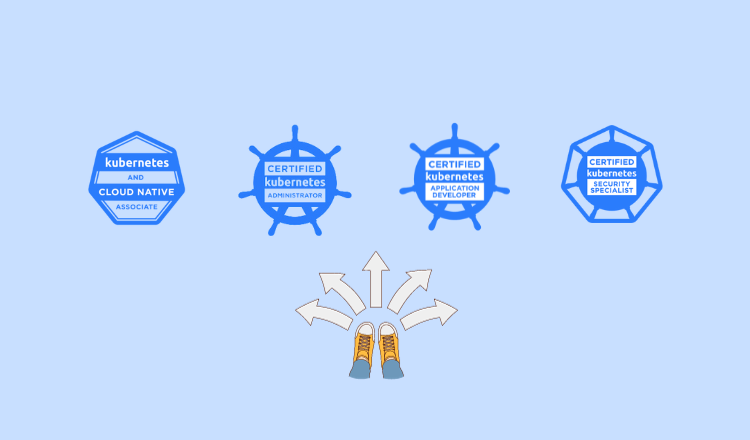Which Kubernetes Certification is Right for Your Career? A Role-Based Guide

Navigating the world of Kubernetes certifications can be confusing, especially when you’re trying to figure out which one aligns with your career goals.
This guide aims to simplify that journey for you. We’ll break down Kubernetes certifications by job roles, helping you make an informed decision that could be a game-changer for your career.
Note: For those of you looking for a quick overview, there’s a summary table at the end of this post that breaks down Kubernetes certifications by job role.
For Software Developers
Recommended Certification: Certified Kubernetes Application Developer (CKAD)
Why It’s Good: This certification focuses on designing, building, configuring, and exposing cloud-native applications for Kubernetes. It’s perfect for software developers who want to show their expertise in running applications on Kubernetes.
For System Administrators
Recommended Certification: Certified Kubernetes Administrator (CKA)
Why It’s Good: This certification is tailored for system administrators who will be responsible for setting up and managing a Kubernetes cluster. It covers a broad range of topics from installation to troubleshooting.
For DevOps Engineers
Recommended Certifications: Certified Kubernetes Administrator (CKA) and Certified Kubernetes Security Specialist (CKS)
Why It’s Good: Once you complete CKA you should focus on CKS as well. Security is a major concern in DevOps. This certification is designed for those who are responsible for the security of a Kubernetes cluster. It’s an advanced certification that builds on CKA.
For Cloud Architects
Recommended Certification: Kubernetes and Cloud Native Associate (KCNA)
Why It’s Good: Cloud architects often need to integrate Kubernetes into broader cloud strategies. This certification provides a foundational understanding of Kubernetes and cloud-native technologies.
If you’re a Cloud Architect and you also work with Kubernetes every day, you should aim for these certifications in this order: KCNA, then CKA, and finally CKS.
For Site Reliability Engineers
Recommended Certification: Certified Kubernetes Administrator (CKA) or Certified Kubernetes Application Developer (CKAD)
Why It’s Good: SREs need to ensure that applications are highly available and meet performance objectives. Both CKA and CKAD offer valuable skills for this role, but CKA is more focused on administrative tasks while CKAD is more application-centric.
For Security Analysts
Recommended Certification: Certified Kubernetes Security Specialist (CKS)
Why It’s Good: This certification is crucial for security analysts responsible for identifying vulnerabilities and implementing security measures in a Kubernetes environment.
By choosing a certification that aligns with your job role, you can ensure that you’re gaining skills that will be directly applicable to your day-to-day tasks and make you more valuable in the job market.
Note: You need to have a valid CKA certification to appear for CKS certification. CKS is more challenging than CKA
Summary for Busy Readers
| Job Role | Certification | Why It’s Good |
|---|---|---|
| Software Developers | Certified Kubernetes Application Developer (CKAD) | Focuses on designing, building, and configuring cloud-native applications for Kubernetes. |
| System Administrators | Certified Kubernetes Administrator (CKA) | Covers a broad range of topics from installation to troubleshooting a Kubernetes cluster. |
| DevOps Engineers | Certified Kubernetes Administrator (CKA) and Certified Kubernetes Security Specialist (CKS) | Designed for those responsible for the security of a Kubernetes cluster. Builds on CKA. |
| Cloud Architects | Kubernetes and Cloud Native Associate (KCNA) | Provides a foundational understanding of Kubernetes and cloud-native technologies. |
| Site Reliability Engineers | Certified Kubernetes Administrator (CKA) or CKAD | CKA focuses on administrative tasks, while CKAD is more application-centric. Both are valuable for SREs. |
| Security Analysts | Certified Kubernetes Security Specialist (CKS) | Crucial for identifying vulnerabilities and implementing security measures in a Kubernetes environment. |
Conclusion
Choosing a Kubernetes certification that aligns with your job role ensures that you’re gaining skills directly applicable to your day-to-day tasks. This not only makes you more proficient but also more valuable in the job market.
Take the first step today in advancing your career with the right Kubernetes certification. If you are planning for the certification, make sure to check the Linux Foundation Coupons to save up to 50% on certification registration.


Responses